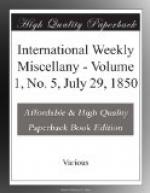Thus reason the profound. Thus saith the good practical man, who, because his mind is a congeries of commonplaces, piques himself on not being led away by his imagination. The owl prides himself on the incontestable fact that he is not an eagle.
To us the matter has another aspect. The appearance of Poets and men of Sentiment in the world of Politics is a good symptom; for at a time like the present, when positive doctrine can scarcely be said to exist in embryo, and assuredly not in any maturity, the presence of Imagination and Sentiment—prophets who endow the present with some of the riches borrowed from the future—is needed to give grandeur and generosity to political action, and to prevent men from entirely sinking into the slough of egotism and routine. Salt is not meat, but we need the salt to preserve meat from corruption. Lamartine and Victor Hugo may not be profound statesmen; but they have at least this one indispensable quality of statesmanship; they look beyond the hour, and beyond the circle, they care more for the nation than for “measures;” they have high aspirations and wide sympathies. Lamartine in power committed many errors, but he also did great things, moved thereto by his “Imagination.” He abolished capital punishment; and he freed the slaves; had the whole Provisional Government been formed of such men it would have been well for it and for France.
We are as distinctly aware of the unfitness of a poet for politics, as any of those can be who rail at Hugo and Lamartine. Images, we know, are not convictions; aspirations will not do the work; grand speeches will not solve the problems. The poet is a “phrasemaker”; true; but show us the man in these days who is more than a phrasemaker! Where is he who has positive ideas beyond the small circle of his speciality? In rejecting the guidance of the Poet to whom shall we apply? To the Priest? He mumbles the litany of an ancient time which falls on unbelieving ears. To the Lawyer? He is a metaphysician with precedents for data. To the Litterateur? He is a phrasemaker by profession. To the Politician? He cannot rise above the conception of a “bill.” One and all are copious in phrases, empty of positive ideas as drums. The initial laws of social science are still to be discovered and accepted, yet we sneer at phrasemakers! Carlyle, who never sweeps out of the circle of sentiment—whose eloquence is always indignation—who thinks with his heart, has no words too scornful for phrasemakers and poets; forgetting that he, and we, and they, are all little more than phrasemakers waiting for a doctrine!




